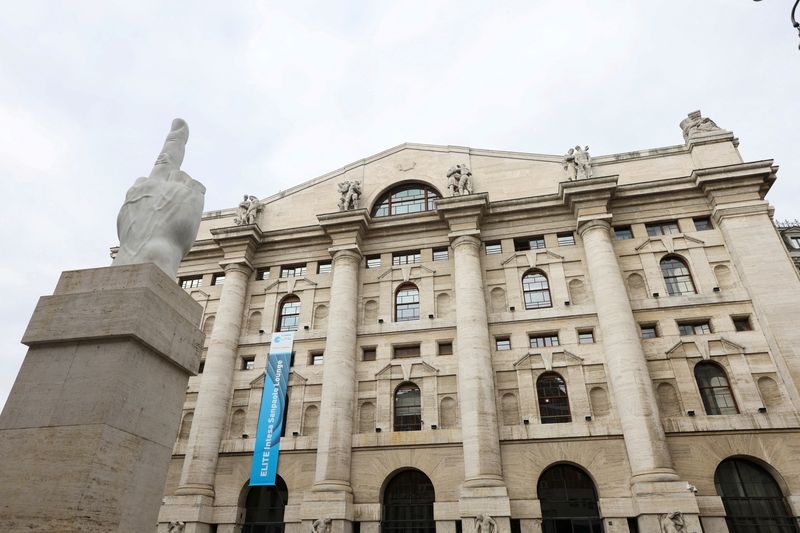By Giuseppe Fonte and Valentina Za
ROME (Reuters) - Italian Prime Minister Giorgia Meloni faces mounting criticism over a government bill to overhaul the country's capital markets, after it was amended to include measures that boost the influence of leading investors in listed companies.
Representatives of investment funds and Italy's financial industry have all voiced concerns that the proposed legislation, which parliament is expected to approve in February, could backfire and discourage foreign investments.
HOW BIG IS ITALY'S EQUITY MARKET?
With an overall capitalisation of 762 billion euros ($871 billion), the Milan bourse lags Paris' 3.6 trillion euros or Amsterdam's 1.4 trillion euros, based on 2023 year-end data from Euronext that operates the three exchanges.
Announced in April 2023, the bill aims to attract newcomers to Borsa Italiana, after the Milan stock exchange lost a string of prominent companies in recent years to other markets and buyouts.
The package includes measures to simplify the listing process and expands the range of firms that can benefit from incentives to list aimed at small- and medium-sized enterprises.
HOW ARE VOTING RIGHTS AFFECTED?
Under a parliamentary amendment to the bill, listed companies can issue shares that boost up to 10-fold the voting rights of longstanding investors, as Italy seeks to stem relocations to the Netherlands, where corporate governance rules help established shareholders keep a tight grip on companies.
The proposal has angered asset managers, including large foreign funds, which favour a "one share, one vote" rule that prevents a concentration of power in the hands of a few.
WHAT'S THE SNAG OVER BOARD RENEWALS?
Lawmakers also want to give investors a bigger say over the conditions under which a company's outgoing board presents a list of candidates for the next term.
Such a practice, common abroad, has only recently been adopted by leading Italian companies, including insurer Generali (BIT:GASI) and banks UniCredit and Mediobanca (OTC:MDIBY). In Italy it is more common for shareholders to propose board candidates.
Under the bill, the outgoing board's list will need approval by at least two-thirds of directors, which critics say could give minority shareholders veto powers.
The bill introduces also a second vote on individual candidates, which professional investors find unnecessary.
Moreover, headhunters say that a new provision requiring board lists to include 30% more candidates than will be elected pose a major hurdle, as nominees need to agree to be included knowing not all of them will get picked.
HOW DOES GENERALI COME INTO THE PICTURE?
The amendment was championed by businessman Francesco Gaetano Caltagirone, an investor in Generali who has repeatedly complained about the influence that Mediobanca exerted on the insurer.
However, Generali Chief Excutive Philippe Donnet in November said the legislation could make large listed groups unmanageable.
If passed, as expected, by parliament, the new rules will become effective in 2025 and companies will have to amend their bylaws by then to comply.
WHAT ROLE DID THE GOVERNMENT PLAY?
In announcing the bill last year, Italy's Treasury proposed that voting rights enhancements would only apply to companies that plan to list, given its goal was to persuade business owners to go public without worrying about losing control.
Yet the cabinet office and the ruling parties opted for a more aggressive approach, extending to listed companies the possibility of issuing shares with up to 10 times voting rights.
Meloni also defended the provision on the board list, saying this month it would curb the practice of directors getting re-appointed indefinitely with little regard to shareholders.
WHAT HAPPENS NEXT?
Government representatives have said Rome will not backtrack on either of the disputed measures.
However, political sources told Reuters that Meloni's administration could revisit the rule on the board slate later this year, as it plans a new set of measures to boost Italy's financial markets.

Such a U-turn has a precedent as Italy last year shocked investors with a windfall bank tax which it later effectively neutered.
($1 = 0.9183 euros)